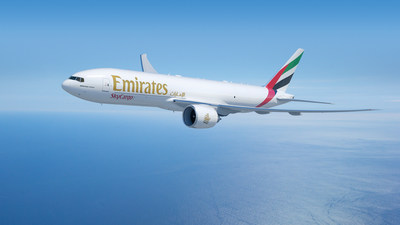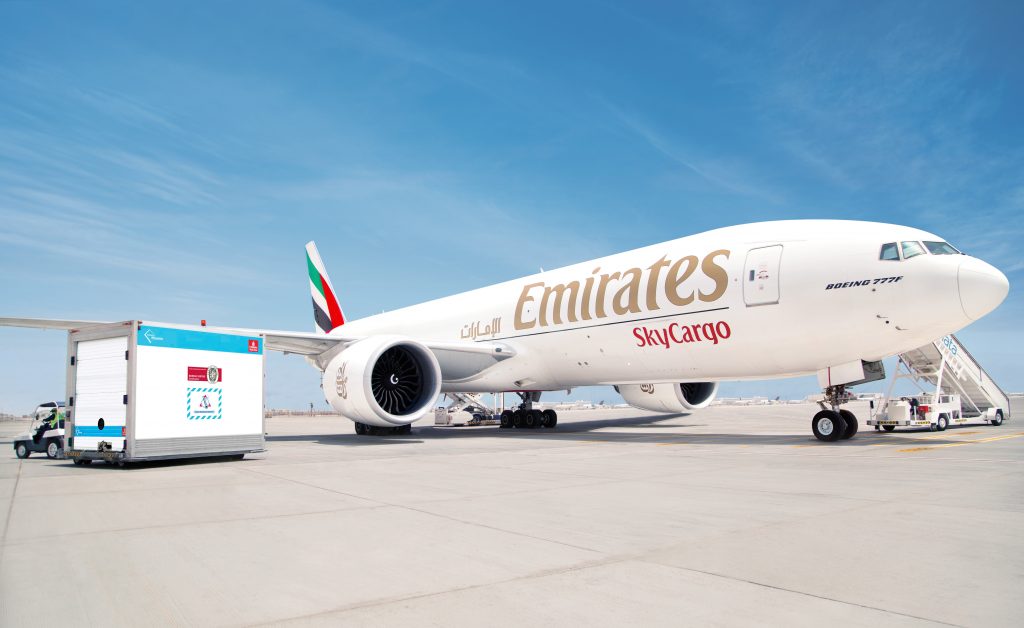Emirates SkyCargo invests for the future
06 / 01 / 2023

Image source: Emirates
The last 14 months have been a busy period for Emirates SkyCargo.
Not only has the carrier been managing heightened demand – at least until the second half of last year – and the recovery of bellyhold operations, but it has made a series of investments.
Firstly, in November 2021 the carrier announced an order for two B777 freighters with Boeing – both delivered last year – and the conversion of four B777-300ERs to an all-cargo configuration through IAI.
The conversion order was later upgraded to a total of 10 B777 aircraft to be delivered by 2026.
Then in November last year, the carrier announced an order for a further five B777Fs, with two units to be delivered in 2024 and the remaining three in 2025.
There have also been developments in other areas of the business.
In late September, the carrier announced the signing of a Memorandum of Understanding (MoU) with United Cargo and the placing of its capacity on the WebCargo platform, representing Emirates SkyCargo’s first foray into third-party online booking.
The carrier has been rolling out customer access to the WebCargo platform in a phased approach, starting with Spain, the Netherlands, Germany, France, Italy, The UK and Turkey.
In October, its capacity was made available on the platform across the rest of Europe, followed by Australia and the US in November.
Customers in Asia and Africa are expected to have access this month.
Emirates divisional senior vice president, cargo, Nabil Sultan tells Air Cargo News that the decision to place capacity on the WebCargo platform is a reflection of the industry’s ongoing digital drive.
“When you look at supply chain and logistics as an industry, even though it is probably one of the oldest trades in the world, it has lagged when it comes to technology,” he says.
“It is trying to catch up in different areas of digitalisation to manage capacity and ensure that the connection with our customers is digital.”
The Covid pandemic also accelerated the adoption of digital technology, Sultan says.
He explains that the pandemic placed an enormous amount of pressure on air cargo and in response, the industry looked for new ways to create efficiencies.
“When demand exploded I think everyone realised that it is time to digitalise and ensure that we have a seamless operation and a seamless way of managing inventory and rates so that we are able to cope with demand,” Sultan says.
“If nothing else, the pandemic has expedited that process. I think across the industry we are seeing a lot of traction with digitalisation and e-bookings and we are probably going to see huge evolution in the coming three to five years.”

Nabil Sultan, Emirates Divisional Senior Vice President Cargo
United in partnership
At the same time that Emirates SkyCargo announced its move into the world of third-party booking portals, it also revealed plans to ramp up its partnership with United Cargo.
The MoU signed by the carriers includes working closely on expanding cargo interline options and block space agreements.
This MoU will build on existing cargo interline arrangements between both air cargo operators and offer freight forwarder customers access to more capacity on a larger combined global network.
United Cargo, which last year said it had decided against entering the full-freighter market, will have access to Emirates SkyCargo’s high frequency distribution network through the bellyhold of passenger flights to over 100 global destinations and 11 B777 freighters.
Emirates SkyCargo will have access to over 200 cities in the US and 300 cities across five continents through United Cargo.
Sultan says that the partnership follows on from a similar agreement signed between the two carrier’s passenger businesses weeks before the cargo agreement was reached.
“We believe that our capacity is complementary in nature,” he says. “Emirates has a big network in the Middle East, Africa and Europe which would be of great interest to United.
“And I think it is the same for us – the fact that they are one of the largest cargo airlines in North America and they have a vast network across North and South America is quite attractive for us.”
Sultan explains that while Emirates does offer non-stop flights to the US the long-haul nature of the operations means that cargo capacity is constrained by passenger baggage.
He says the partnership with United will help address some of the capacity shortages the carrier faces in terms of its bellyhold operations.
Freighter frenzy
While the move to add freighters seemed like a straight forward decision when the first deal was announced back in November 2021, given rising demand and capacity shortages, the market has since turned and the outlook is bleak with many expecting a global recession this year following on from a period of high inflation.
However, Sultan remains positive about the additional freighters given the scale of the Emirates network.
“We are a network airline,” he says. “We operate to almost 140 destinations across the globe with widebody aircraft that have substantial belly capacity.
“For most of the key cities, metropole cities, that we operate to there is nothing less than a daily flight.
“With that kind of reach it becomes essential to have a freighter operation that supplements and creates a feed for all our passenger bellyholds.
“We plug in the freighters with 100 tonnes of capacity into key production markets, the big manufacturing centres, and then bring in the cargo into our hubs and disseminate all of that into our passenger bellies.”
He points out that Emirates only operates widebody aircraft, which can carry up to 20 tonnes of cargo on each flight – a big void to fill when those aircraft are operating on a daily basis to many destinations.

Copyright: Emirates SkyCargo
Covid changes
Coming out of the Covid-19 pandemic, Sultan says that the airline has become more agile in the way it reacts to market changes, something that is more important during a downturn.
“The fluctuations we have seen, the new markets that have emerged, it is like managing a stock market, one day it is up and one day it is down.
“We follow what is happening around the world very closely both on the geopolitical side of the business and how is that influencing and impacting production across the world and therefore we re-deploy capacity where it is needed very quickly.”
He explains that at the height of the Covid pandemic the carrier quickly ramped up its capacity into markets like Vietnam, which saw an increase in exports as companies looked to diversify their production lines to spread risk.
“We have a very agile operation and we are constantly evaluating and monitoring what is happening around the world and re-aligning our capacity to where it is needed,” says Sultan.
“There is not much room for planning. Planning and execution happen almost simultaneously and that is how we have been trained throughout the pandemic and we have become better at it as we move forward.”
Emirates Skycargo to expand freighter fleet with $1bn investment













